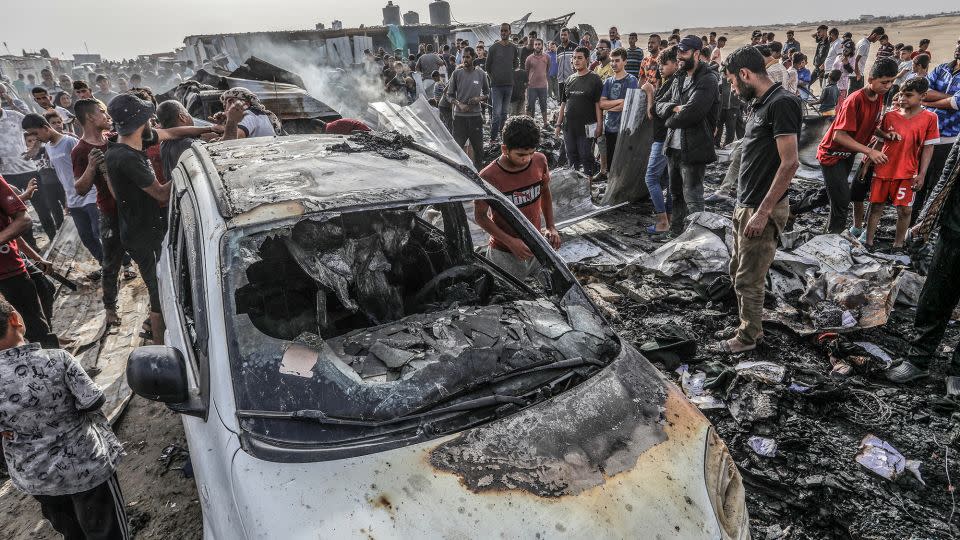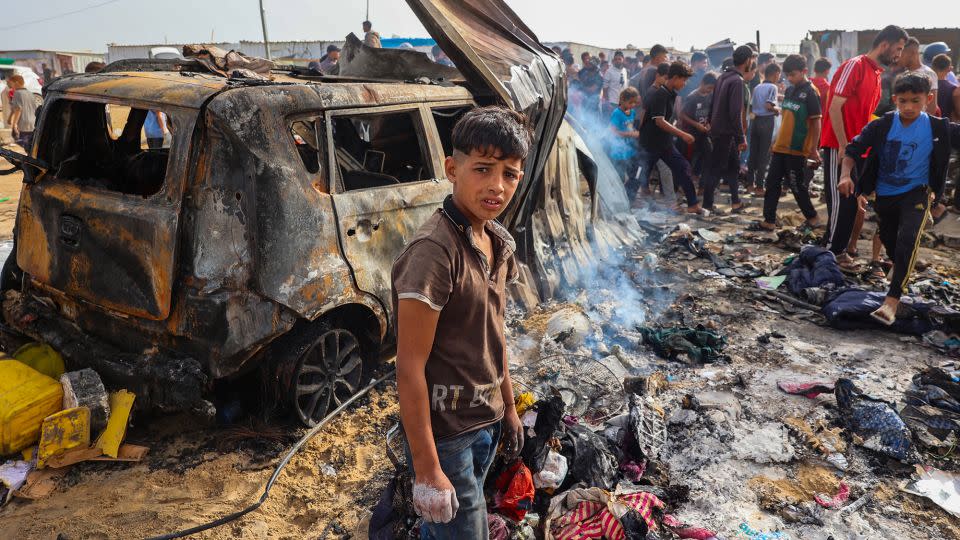Israeli strike that killed 45 at camp for displaced Palestinians in Rafah a ‘tragic error,’ Netanyahu says
Editor’s Note: A version of this story appears in CNN’s Meanwhile in the Middle East newsletter, a three-times-a-week look inside the region’s biggest stories. Sign up here.
Israel’s Prime Minister Benjamin Netanyahu said Monday an airstrike that killed dozens of people at a camp for displaced Palestinians in Rafah, Gaza, was a “tragic error.”
“Despite our best effort not to harm those not involved, unfortunately a tragic error happened last night. We are investigating the case,” Netanyahu said in a speech at the Israeli Knesset.
At least 45 people were killed and more than 200 others injured after a fire broke out at the camp following the strike, most of them women and children, according to the Gaza Health Ministry and Palestinian medics. No hospital in Rafah had the capacity to take the number of casualties, the ministry said.
Footage obtained by CNN showed the camp in flames, with scores of men, women and children frantically trying to find cover from the nighttime assault. Burned bodies, including those of children, could be seen being pulled by rescuers from the wreckage.
“Several civilians are still trapped inside the camp, which was attacked without warning,” a Palestinian man filming the fire said. “This was declared a safe zone.”
United Nations Secretary-General Antònio Guterres issued a blistering condemnation on Monday. “I condemn Israel’s actions which killed scores of innocent civilians who were only seeking shelter from this deadly conflict,” he said on X. “There is no safe place in Gaza. This horror must stop.”
A UN diplomat told CNN that the Security Council will hold an emergency meeting Tuesday to discuss the airstrike at the request of Algeria. It will hold private discussions at 3.30 p.m., the diplomat said.
A US official told CNN Monday that Israel had told the Biden administration it used a precision munition to hit a target in Rafah, but that the explosion from the strike ignited a fuel tank nearby and started a fire that engulfed a camp for displaced Palestinians and led to dozens of deaths.
“We can’t confirm that but it’s what Israel shared with us,” the official said, “and we assume we will learn more once Israel completes its investigation.”
The attack came after Hamas launched rockets at Tel Aviv on Sunday for the first time in months. The Israel Defense Forces (IDF) said that eight rockets were fired from the Rafah area, and that “a number of projectiles” had been intercepted. The IDF said it destroyed the rocket launchers used by Hamas shortly after the strikes.

The Israeli military said in a statement earlier on Monday that it had struck “a compound in Rafah in which significant Hamas terrorists were operating.” It said the strike killed two Hamas officials – West Bank Chief of Staff Yassin Rabia and senior Hamas member Khaled Nagar. CNN cannot verify these claims.
The IDF said in a later statement Monday that its Fact Finding and Assessment Mechanism – an independent body responsible for examining allegations of misconduct in conflict – will investigate the “circumstances of the deaths of civilians in the area of the strike.”
It was among the deadliest strikes by the Israeli military on Gaza’s southernmost city since Israel began its operation there on May 7. It also came just days after the International Court of Justice (ICJ), the United Nations’ top court, ordered Israel to “immediately halt” its military operation in Rafah, and any other action in the city, “which may inflict on the Palestinian group in Gaza conditions of life that could bring about its physical destruction in whole or in part.”
The IDF said the attack was conducted based on “prior intelligence” indicating that senior officials of Hamas’ West Bank wing were present at the site.
The IDF said it had assessed there would be “no expected harm to uninvolved civilians.”
More than 36,000 people have been killed in Gaza since Israel launched its military operation there, according to the Ministry of Health in the enclave, which started after Hamas-led militants attacked Israel on October 7, killing 1,200 people and taking 250 hostages, according to Israeli authorities.
‘Hell on earth’
Footage of the aftermath shared on social media showed chaotic scenes.
In one video, the lifeless body of a man was seen being dragged by the legs out of the flames. “He’s dead, he’s dead,” a rescuer says before moving on to find others. In another video, a man wept as he held up the headless body of a toddler for the camera. Women shrieked in grief as children peered into the fire. A man with a bloodied face stood in apparent shock, examining his wounds with one hand, as he held an infant with blood-stained clothes in the other arm. One of the bodies pulled out of the fire was charred-stiff.
By Monday morning, the camp was in ruins with small fires still burning. Men and boys gathered around, rummaging through the burned and smoking wreckage for food and their belongings as drones hovered above. One of the structures still standing was a sign that read: “Kuwait peace camp 1.”
Children and women living in makeshift tents were among those killed, according to a post on X from UNRWA Commissioner-General Philippe Lazzarini.
“The images from last night are testament to how Rafah has turned into hell on earth,” the commissioner-general said Monday.
“Others were reportedly burnt to death,” Lazzarini said. The reporting is based on open-source photos and videos which were shared with UNRWA, including from social media, UNRWA spokesperson Juliette Touma told CNN.

Mohammad Abu Al Subeh, a displaced Palestinian man who survived the strike, said as he was lying in bed in the evening when he saw “rockets fired down at us.”
“It shook the earth like an earthquake,” Abu Al Subeh, who fled his home in Nuseirat some five months ago, told CNN. He had to escape through the window of his makeshift house in the desert area where the camp is located. “I came here based on the leaflet that was dropped (by Israel) saying go to this humanitarian area,” he said. “It’s just civilians here.”
Abu Nidal Al Attar, another displaced Palestinian who witnessed the attack, told CNN: “We were sitting as normal people do” when they suddenly saw strikes and fire. “We went to see, and they were pulling out burned people.”
Hamas called the attack “a horrific war crime” and “terrible massacre.”
International outrage
International condemnation was swift, with UN agencies, aid groups and governments calling on Israel to respect the ICJ ruling and halt its Rafah operation.
UN Secretary-General Antonio Guterres on Monday condemned the airstrike. “There is no safe place in Gaza. This horror must stop,” he said in a post on X.
“Despite the ICJ binding ruling, Israel struck Rafah and Hamas fired rockets to Israel,” the EU foreign policy chief, Josep Borrell, wrote Monday on X. On Monday, in a meeting with Arab leaders to discuss Gaza and the Middle, Borrell said that “what we have seen in the immediate hours is that Israel continues the military action that it has been asked to stop.”
Medical charity Doctors Without Borders (MSF) said it was “horrified by this deadly event, which shows once again that nowhere is safe.” The United Nations Relief and Works Agency for Palestine Refugees (UNRWA) said “Gaza is hell on earth,” referring to the Rafah attack.
French President Emmanuel Macron said he was “outraged” and called for an “immediate ceasefire.”
Critics have pushed back on Israel’s claims. Already worried about an intensifying war right on its border with Gaza, Egypt on Monday condemned Israel’s strike on Rafah, calling on the Jewish state to implement the ICJ ruling of “halting military operations” in Rafah and to “comply with its responsibilities as an occupying power”.
A mediator in the war, Egypt is set to host another round of indirect negotiations between Israel and Hamas on Tuesday. Qatar, another key mediator, said Israel’s strike could “hinder” ongoing negotiations, and called the attack a “serious violation of international law.”

Over a million Palestinians had been sheltering in Rafah before Israel began its operations there, having fled there from other areas of Gaza after Israel began its military campaign in the territory.
Israel has said it had ordered civilians to leave some areas of Rafah, but many remain there, sheltering in what Israel designated as “safe zones.”
More than 800,000 people have fled Rafah since May 6, according to UN figures.
Israel has vowed to press on with its Rafah operation despite international outrage and a US warning not to proceed. In response to the ICJ ruling last week, Israel said it “has not and will not conduct military actions in the Rafah area which may inflict on the Palestinian civilian population in Gaza conditions of life that could bring about its physical destruction in whole or in part.”
Clarification: This story has been updated after additional review of the translation from Hebrew to English, to clarify the wording used by Israeli Prime Minister Benjamin Netanyahu when he referred to a deadly Israeli strike on Rafah, Gaza. The word “error”was originally translated as “mistake.”
CNN’s Zeena Saifi, Hamdi Alkhshali, Mostafa Salem, James Frater and Lauren Kent contributed to this report. Nadeen Ebrahim wrote from Abu Dhabi.
For more CNN news and newsletters create an account at CNN.com


